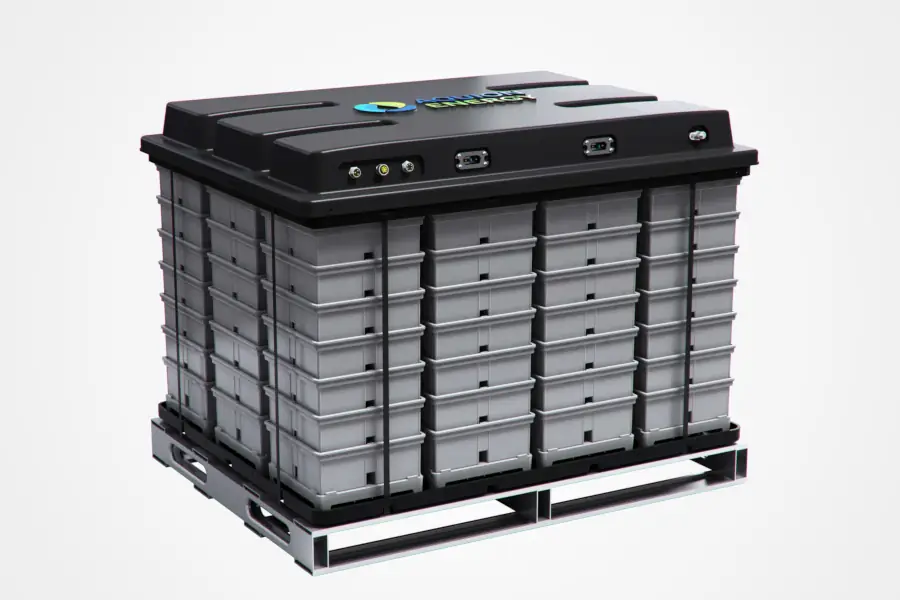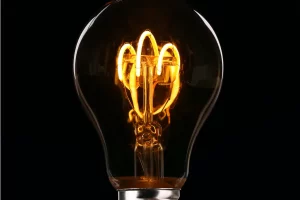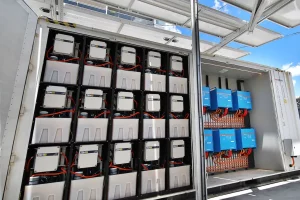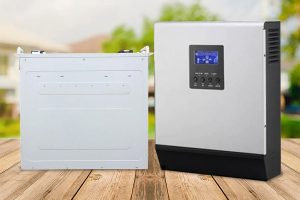In our quest for efficient and sustainable energy storage solutions, a growing interest has emerged in saltwater batteries. Utilizing the abundance of saltwater and the principles of electrochemical reactions, these batteries offer a promising alternative for electricity storage.
The use of saltwater batteries represents a significant shift towards safer, environmentally friendly, and sustainable energy storage technologies. Unlike traditional battery chemistries, saltwater batteries leverage non-toxic materials and avoid hazardous components, contributing to a greener and cleaner energy landscape. With a focus on sustainability and reduced environmental impact, saltwater batteries have garnered attention as a potential solution for residential and commercial electricity storage.

Throughout this article, we look at the key benefits of saltwater batteries. We will explore their safety advantages, considering the absence of flammable or toxic materials, which enhances the overall security of energy storage systems. Additionally, we will examine the environmental friendliness of saltwater batteries, analyzing their potential to minimize ecological risks and facilitate responsible waste management.
Is saltwater batteries viable solution for electricity storage at residential homes
Yes, saltwater batteries can be used for electricity storage at home. Saltwater batteries, also known as saltwater or saline batteries, utilize a saltwater electrolyte solution to store and release electrical energy. They are a type of flow battery, which means they store energy in liquid electrolytes contained in separate tanks.
Saltwater batteries are considered safer compared to traditional lead-acid or lithium-ion batteries. They do not contain toxic or flammable materials, reducing the risk of accidents or environmental hazards.
These batteries are environmentally friendly, as they use non-toxic, abundant materials. The saltwater electrolyte solution can be easily disposed of without causing harm to the environment.
Saltwater batteries have a longer lifespan compared to some other battery types. They can endure a high number of charge-discharge cycles, providing consistent performance and reducing the need for frequent replacements.
This type of batteries is highly scalable, allowing you to expand your storage capacity as needed. Additional electrolyte solution can be added to increase the energy storage capacity, making them adaptable to varying energy demands.
Saltwater batteries typically require minimal maintenance. Unlike some other battery chemistries, they do not require regular monitoring of electrolyte levels or complex balancing procedures.
While saltwater batteries offer these advantages, it’s important to consider their limitations. They generally have lower energy density compared to lithium-ion batteries, meaning they may require more physical space to achieve the desired storage capacity. Additionally, their efficiency and power output may be lower than some other battery technologies.
What are pros and cons of using saltwater batteries for home electricity storage?
Using saltwater batteries for home electricity storage offers certain advantages and disadvantages. Let’s look at the pros and cons of using saltwater batteries:
Pros of saltwater type batteries
- Safety. Saltwater batteries are considered safer compared to other battery chemistries like lithium-ion or lead-acid. They do not contain toxic or flammable materials, reducing the risk of accidents or environmental hazards.
- Environmental Friendliness. Saltwater batteries utilize non-toxic and abundant materials, making them environmentally friendly. The saltwater electrolyte solution is safe to handle and can be easily disposed of without causing harm to the environment.
- Longevity. Saltwater batteries generally have a longer lifespan compared to some other battery types. They can endure a high number of charge-discharge cycles, providing consistent performance over an extended period. This longevity reduces the need for frequent battery replacements.
- Scalability. Saltwater batteries are highly scalable, allowing you to increase your energy storage capacity as needed. Additional electrolyte solution can be added to expand the system’s storage capability, making them adaptable to varying energy demands.
- Low Maintenance. Saltwater batteries typically require minimal maintenance. They do not require regular monitoring of electrolyte levels or complex balancing procedures, reducing the time and effort required to maintain the system.
Disadvantages of saltwater type batteries
- Lower Energy Density. Saltwater batteries generally have lower energy density compared to lithium-ion batteries. This means they may require more physical space to achieve the same storage capacity, which can be a constraint in space-limited applications.
- Lower Efficiency. Saltwater batteries have lower energy efficiency compared to some other battery technologies. This can result in a less efficient conversion of stored energy during the charge-discharge process, leading to some energy loss.
- Limited Power Output. Saltwater batteries may have a lower power output compared to other battery chemistries. They may not be suitable for applications that require high power demands or rapid energy discharge.
- Cost. While saltwater batteries are considered safer and environmentally friendly, they may have a higher upfront cost compared to some other battery types. The initial investment for saltwater battery systems can be relatively higher, which may impact the overall cost-effectiveness.
When considering the use of saltwater batteries for home electricity storage, it’s essential to evaluate these pros and cons in the context of your specific needs, budget, and energy requirements.
Which manufacturers make saltwater batteries for home electricity storage
There are several manufacturers that produce saltwater batteries for home electricity storage. Here are a few notable ones:
Aquion Energy
Aquion Energy, now owned by EnerSys, was a leading manufacturer of saltwater batteries. They produced the Aqueous Hybrid Ion (AHI) batteries, which utilized a saltwater electrolyte solution. However, as of my knowledge cutoff in September 2021, Aquion Energy had temporarily halted production and was evaluating strategic options.
BlueSky Energy
BlueSky Energy is a European company that acquired the assets and intellectual property of Aquion Energy. They continue to develop and manufacture saltwater batteries under the brand name “Greenrock.”
ZCell by Redflow
Redflow, an Australian company, offers a unique zinc-bromine flow battery called ZCell. While not strictly a saltwater battery, it is often categorized within the same group of environmentally friendly and non-toxic energy storage solutions.
What are the best saltwater battery alternatives for storing electricity at home
There are a few alternative options for home electricity storage that utilize different battery chemistries and offer similar benefits. These alternatives include:
- Lithium Iron Phosphate (LiFePO4) Batteries. LiFePO4 batteries are known for their long lifespan, high energy density, and excellent safety profile. They can be a suitable alternative for saltwater batteries, offering reliable performance and efficient energy storage. LiFePO4 batteries are widely used in residential and commercial applications and are compatible with solar and other renewable energy systems.
- Zinc-Bromine Flow Batteries. Zinc-bromine flow batteries are another alternative for home electricity storage. They use a zinc-based anode and a bromine-based electrolyte solution to store and release electrical energy. These batteries offer high energy density, long cycle life, and scalability. They are particularly suitable for applications that require frequent deep cycling and long-duration storage.
- Lithium-Ion Batteries. Lithium-ion batteries are widely used in various applications, including electric vehicles and portable electronics. They offer high energy density, efficiency, and power output. Lithium-ion batteries are available in different chemistries, such as lithium iron phosphate (LiFePO4) and lithium nickel manganese cobalt oxide (NMC), each with its own set of characteristics and trade-offs.
When considering alternative options for saltwater batteries, it’s crucial to assess factors such as energy requirements, available space, budget, and specific needs.
Conclusion
Saltwater type batteries offer a compelling solution for electricity storage with their unique combination of safety, environmental friendliness, and reliability. As we seek sustainable energy alternatives, these batteries provide an innovative approach that aligns with our growing focus on eco-consciousness.
The inherent safety of saltwater batteries, free from flammable or toxic materials, ensures peace of mind and reduces potential risks associated with energy storage. Their environmental friendliness, utilizing non-toxic materials and facilitating responsible waste management, contributes to a greener energy landscape.
While saltwater batteries exhibit advantages in terms of safety and environmental impact, it’s important to consider their limitations. Factors such as energy density, system size, and cost should be carefully evaluated to determine the feasibility and suitability of saltwater battery systems for specific electricity storage needs.
As the field of renewable energy and energy storage continues to evolve, saltwater batteries hold promise as a sustainable solution. Their potential applications in residential, commercial, and off-grid scenarios open up new possibilities for energy independence and resilience.



